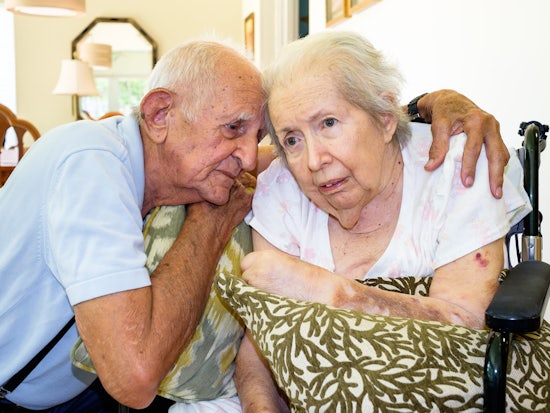Survey shows serious shortage for aged care respite
Accessing respite as a carer of an older Australian has been revealed an almost impossible task as research shows a serious shortage of accommodation options.

A new survey suggests respite for carers is in short supply (Source: Shutterstock)
The research conducted by Carers Australia, in the form of a national survey of organisations helping carers access respite services, shows a number of issues when accessing this vital service.
Carers Australia Chief Executive Officer (CEO) Ara Cresswell says there is “increasing difficulty” for carers to find respite care when they need a break, with the survey showing that 74 percent of respondents reported high or very high demand for emergency respite, while the level of high demand for pre-planned respite accommodation was 88 percent.
Ms Cresswell says the research also reports that nearly 70 percent say both emergency and pre-planned respite are difficult or very difficult to access, despite undertaking often exhaustive efforts to identify respite opportunities, leaving only 35 percent of respondents able to find respite beds “some of the time”.
“[The survey] shows an increasing difficulty for carers to find respite care when they need a break from the demands of providing around the clock care, or even to deal with their own health or other family issues,” Ms Cresswell explains.
“Caring for the aged can be an exhausting, time-consuming and emotionally wearing task – especially for those carers who are aged themselves.
“For many the opportunity to take a break is vital to their ability to continue providing care at home.
“They will also need to find replacement care for the person they care for if they become ill themselves or have other demands which need attention and take them away from home.”
Ms Cresswell adds that for carers who need to be away for more than a night or two, they are finding that the only respite accommodation option for those they care for is in an aged care facility, which leads to further issues.
“Daily subsidies paid to residential aged care providers by the Government are much higher for permanent residents and for residents convalescing after an illness or operation than for respite care, so there is a disincentive to make short-term stays available for respite care,” she says.
“The difference is even sharper for people with high care needs, including people with advanced dementia.”
Ms Creswell says higher subsidies are needed to encourage aged care providers to offer respite, adding that Carers Australia’s research indicates a high, unfulfilled demand for overnight and weekend respite, particularly in cottage-style accommodation.
Adding that cottage-style respite is “ideal” because it offers home-like surrounding and can feel more like a holiday for the person with care needs.
Dementia Australia CEO Maree McCabe also comments on the Carers Australia survey, saying it makes clear that demand for residential respite care is not being met.
Ms McCabe adds that in the survey, respondents identified a range of issues for carers, including not enough residential respite beds, particularly for high and dementia-specific care needs.
“70 percent of people with dementia live in the community, and carers repeatedly identify good respite care as an important support for a sustainable caring relationship,” she explains.
“Respite is a crucial factor in supporting people with dementia living in our communities; but as the report notes, current residential respite options are limited, and this shortage is not assisted by the fact that people seeking and waiting for permanent care are often using this respite.”
Ms McCabe says Dementia Australia’s own research corroborates that of Carers Australia, saying their research found more than half of primary carers living with people with dementia have indicated they need more support, and the greatest single unmet area of demand is for respite care.
“Unfortunately, there are few dementia-specific respite services and as the care needs of people living with dementia increase, they are often declined respite options,” Ms McCabe says.
“Many respite services say that they are not staffed to provide care to people who have behavioural symptoms of dementia or to those who are incontinent.”
Highlighting the issues within the respite service, Ms Cresswell refers to the recent Aged Care Legislated Review 2017 which recommended to Government a review of existing respite arrangements to “ensure there is an adequate supply of residential respite with equitable access” and that she expects the outcomes of this survey to be taken into account in that review.
Minister for Aged Care Ken Wyatt says the Government recognises the vital role carers play in providing care and support to senior Australians who are frail-aged and those who are disabled, or have a mental or physical illness, adding that respite care is a “crucial support service” for frail older people and their carers.
He says respite is provided in a number of settings, including through the Commonwealth Home Support Programme (CHSP), residential respite and respite through Home Care Packages (HCPs), to allow greater flexibility for carers and consumers.
The Minister also makes note of the fact that the Government will be taking into account recommendation eight of the Tune Review, which calls for a review of the existing respite arrangements.
“The Turnbull Government is taking this into account, as part of its careful consideration of the Tune Review,” he says.
“The Commonwealth, through the Department of Social Services, is developing options for future carer support in the context of and in alignment with, the aged care and disability reforms, and is working towards a more integrated response for carer services through the Integrated Plan for Carer Support Services.”
He adds that this work “reflects the Australian Government’s priorities for carers, and outlines practical actions to recognise, support and sustain the vital work of unpaid carers”.










